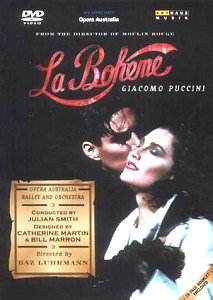La Bohème is one of the first operas with
which I fell in love when in my early teens and more years ago
than I care to remember. I still cherish the Callas / Di Stefano
performance now on CD, which so enthralled me at that time.
Unlike much of the music from those days, the
operas of Puccini delight me now as much as then despite the passage
of time, not least "Bohème".
I first encountered this performance when it
was televised in the UK during the early nineties, and I remember
being greatly impressed by it. Fortunately a friend with more
foresight had made a video recording and we subsequently watched
it many times, always with great pleasure. When the commercial
video became available I hastened to buy a copy but was greatly
disappointed by the absence of subtitles.
About two years ago it was released on DVD (with
subtitles) but only in NTSC format with the USA Regional Coding
which happily my player could handle. It is only now that a PAL
version coded for the UK has been released. Strange indeed are
the ways of the music distribution industry.
From the foregoing it must be clear that this
is a performance which I rate very highly although I recall the
Gramophone being somewhat lukewarm in their reception of the original
release.
So, why my enthusiasm? The answers are fairly
straightforward.
Primarily the performance of the music itself.
Regrettably many contemporary productions seem to overlook that
opera should be above all a musical experience. It should
not in my opinion be hijacked for use as a vehicle for self-aggrandisement
by artistic directors, set designers et al, seeking to
impress the public with their unique, and often bizarre vision
of how a work should be performed.
In this case however, the Production Director
Baz Luhrmann, although a "big name", succeeds completely
in his role because he achieves a production in which the many
diverse elements such as costumes, lighting etc all meld to support
as well as enhance the harmony and pleasure of the whole. While
the staging is relatively "modern" with moveable sets,
any changes during the action are done discreetly with a minimum
of fuss, and for me facilitated rather than distracted from the
performance.
Despite this major achievement, the stars of
the show remain: Puccini, the singers, the conductor and the orchestra,
which is as it should be. The libretto is slightly and sensitively
updated to match current parlance. Picture and sound quality are
excellent, although a widescreen format would doubtless have been
welcomed by some purchasers.
The singers were all previously unknown to me.
They are young, and the quartet of lovers are all sufficiently
attractive to suit their roles which makes a welcome contribution
to the credibility of the events they portray Ö yes I know, if
you want credibility an opera house is the last place to look
for it, but you know what I mean.
Apart from being attractive to behold, they and
all their colleagues sing and act extremely well, performing with
subtlety and sensitivity. The pacing of the music conducted by
Julian Smith seemed to me to be spot on.
Cheryl Barkerís "Mi
chiamano Mimi" is simply one of
the most enjoyable I have heard, and
David Hobson, her Rodolfo, has a very
distinctive timbre which I found truly
thrilling at times. The other principals,
Roger Lemke, Gary Rowley, David Lemke,
and Christine Douglas all contributed
similarly. These are artists whom I
would dearly love to hear in other roles,
and I was intrigued to see Graeme Ewer
repeating his admirable Benoit at Glyndebourne
in a later televised production.
Credit too should be given to this live Australian
audience who are commendably unobtrusive apart from some very
slight but entirely understandable premature applause at the end
of the acts.
Of course no production can be perfect. The set
in Act 3 is very stark but, as it reflects the desolation of the
events taking place therein, does not distract oneís attention
from the drama or the music.
In conclusion therefore, despite the lack of
"superstar names" among the performers my advice would
be: if you are seeking a first class version of this work your
search is over, and if you already have a recording then this
will probably surpass it, so why not duplicate.
Enjoy.
David Dyer
-
